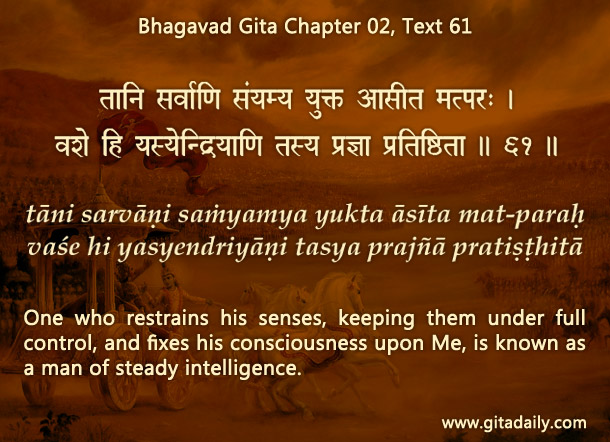A person who is bound usually focuses on breaking free by, say, untying or cutting the binding ropes.
That kind of focus is not the best strategy for breaking free from our bondage in material existence.
Why?
Because our bondage is not physical, but psychological; and becoming free from it rests not on release but on replacement.
Our bondage is not physical, but psychological; and becoming free from it rests not on release but on replacement.
As a relatable example of psychological bondage, let’s consider alcoholics. They are bound by the illusion within their mind – the illusion that the drink which actually brings trouble will give them pleasure. Countering this illusion requires replacing it with reality, not just the reality about the toxicity of alcohol, but also the reality that they can do far better things with their time and life. If, however, they focus only on the resolution, “I won’t drink”, then that in and of itself won’t provide any pleasure. Worse still, their continuous thinking about alcohol, when coupled with their human need for pleasure, will trigger their desire to drink, blind them to its evils and compel them to relapse.
Similarly, to counter our material attachments, we need to focus on reality – not just the reality that those attachments will eventually breed suffering, but also the reality that the best object of attachment awaits us in our own hearts: the supreme spiritual reality, Krishna. As he is the all-attractive reservoir of all pleasure, contemplation on him will give us the inner satisfaction necessary for resisting outer worldly temptations.
Pertinently, the Bhagavad-gita (02.60) warns that mere rejection of worldly pleasures is unsustainable. The next verse (02.61) assures that fixing the mind on Krishna enables conquest of the senses. If we focus on holding on to Krishna through remembrance internally and service externally, our battle against bondage will automatically become joyful and successful.


Hare Krishna Prabhuji
PAMHO
Lord Krishna gives the hint in this verse wherein He instructs us to focus our consciousness upon Him. This is the actual higher taste which can be developed by engaging ourselves in His service and acting for His pleasure. Then only we will experience transcendental bliss which will strengthen our determination to renounce the taste for sense gratification.
Hari Bol
Narottama das